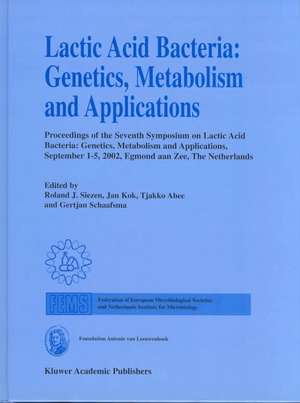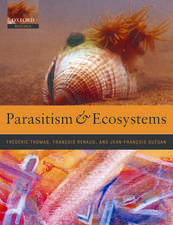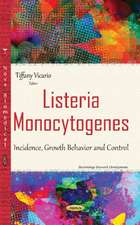Lactic Acid Bacteria: Genetics, Metabolism and Applications: Proceedings of the seventh Symposium on lactic acid bacteria: genetics, metabolism and applications, 1–5 September 2002, Egmond aan Zee, the Netherlands
Editat de Roland J. Siezen, Jan Kok, Tjakko Abee, Gertjan Schaafsmaen Limba Engleză Hardback – 30 sep 2002
To communicate and stimulate the research on lactic acid bacteria and their applications, a series of tri-annual symposia on lactic acid bacteria was started in 1983 under the auspices of the Netherlands Society for Microbiology (NVVM), which was later also supported by the Federation of European Microbiological Societies (FEMS). The aim of these state-of-the-art symposia is to offer a unique platform for universities, institutes, and industry in this area of biotechnology, to present recent work, to obtain information on new developments, and to exchange views with colleagues from all over the world on scientific progress and applications. The growing number of participants at these symposia has been a clear demonstration of the interest of the international industrial and scientific community in this area of research.
The 7th Symposium is based on a number of plenary lectures that review the scientific progress of the last years in the different areas of research on lactic acid bacteria, and which are documented in this special issue of Antonie van Leeuwenhoek.
| Toate formatele și edițiile | Preț | Express |
|---|---|---|
| Paperback (1) | 800.02 lei 39-44 zile | |
| SPRINGER NETHERLANDS – 6 dec 2010 | 800.02 lei 39-44 zile | |
| Hardback (1) | 967.56 lei 6-8 săpt. | |
| SPRINGER NETHERLANDS – 30 sep 2002 | 967.56 lei 6-8 săpt. |
Preț: 967.56 lei
Preț vechi: 1179.96 lei
-18% Nou
Puncte Express: 1451
Preț estimativ în valută:
185.14€ • 193.85$ • 153.56£
185.14€ • 193.85$ • 153.56£
Carte tipărită la comandă
Livrare economică 10-24 aprilie
Preluare comenzi: 021 569.72.76
Specificații
ISBN-13: 9781402009228
ISBN-10: 1402009224
Pagini: 388
Ilustrații: V, 378 p. 101 illus., 27 illus. in color.
Dimensiuni: 178 x 254 x 29 mm
Greutate: 1.08 kg
Ediția:2002
Editura: SPRINGER NETHERLANDS
Colecția Springer
Locul publicării:Dordrecht, Netherlands
ISBN-10: 1402009224
Pagini: 388
Ilustrații: V, 378 p. 101 illus., 27 illus. in color.
Dimensiuni: 178 x 254 x 29 mm
Greutate: 1.08 kg
Ediția:2002
Editura: SPRINGER NETHERLANDS
Colecția Springer
Locul publicării:Dordrecht, Netherlands
Public țintă
ResearchCuprins
Editorial.- Lactic acid bacteria: genetics, metabolism and applications.- Keynote Lecture.- The cell membrane and the struggle for life of lactic acid bacteria.- Genetics.- Discovering lactic acid bacteria by genomics.- Global control of sugar metabolism: a Gram-positive solution.- Comparative genomics of phages and prophages in lactic acid bacteria.- Gene regulation in Lactococcus lactis: the gap between predicted and characterized regulators.- Genetics Short Lectures.- Transcriptome analysis and related databases of Lactococcus lactis.- Genome plasticity in Lactococcus lactis.- Regulation of antimicrobial peptide production by autoinducer-mediated quorum sensing in lactic acid bacteria.- Metabolism.- Transporters and their roles in LAB cell physiology.- Lantibiotics produced by lactic acid bacteria: structure, function and applications.- Stress responses in lactic acid bacteria.- Metabolic engineering of lactic acid bacteria for the production of nutraceuticals.- Metabolism Short Lectures.- Experimental determination of control of glycolysis in Lactococcus lactis.- Metabolism of lactic acid bacteria studied by nuclear magnetic resonance.- Respiration capacity and consequences in Lactococcus lactis.- Glutamate dehydrogenase activity: a major criterion for the selection of flavour-producing lactic acid bacteria strains.- Applications.- Probiotics: an overview of beneficial effects.- Product development strategies for foods in the era of molecular biotechnology.- Bacteriophage-resistance systems in dairy starter strains: molecular analysis to application.- Applications Short Lectures.- In situ delivery of cytokines by genetically engineered Lactococcus lactis.- Anti-hypertensive activity of fermented dairy products containing biogenic peptides.- The Intestinal LABs.- Lactic acid bacteria in a changing legislative environment.- Genetically modified Streptococcus mutans for the prevention of dental caries.- Exploiting exopolysaccharides from lactic acid bacteria.












